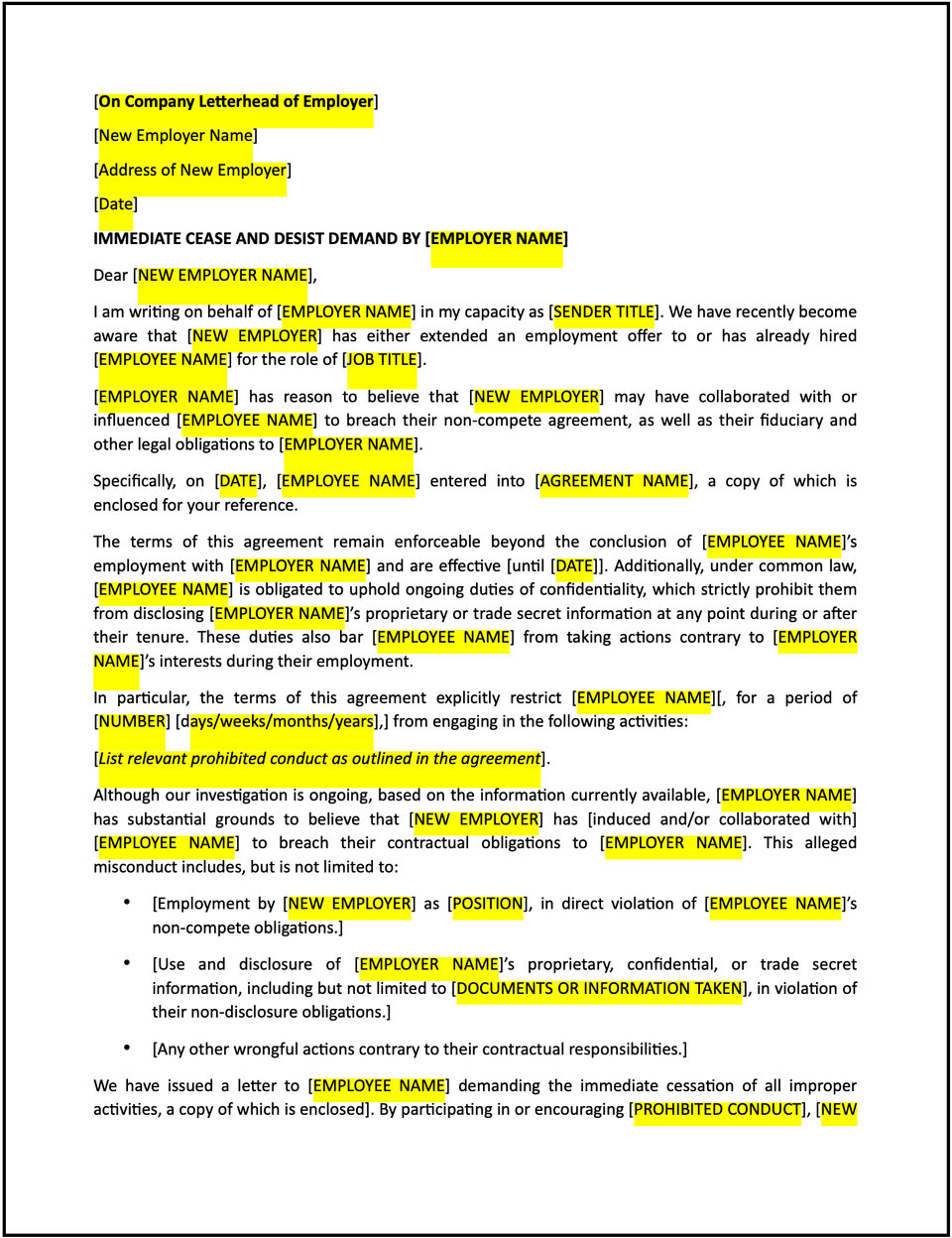Alleged breach of non-compete clause letter (to new employer and former employee): Free template

Alleged breach of non-compete clause letter
A letter of notice of an alleged breach of a non-compete clause is a formal way to notify both the former employee and their new employer about a potential violation of contractual obligations. This letter provides a professional approach to assert your rights, outline the breach, and seek resolution.
How to use this alleged breach of non-compete clause letter
- Open with context: Begin by referencing the employment agreement and the specific non-compete clause allegedly breached.
- Identify the breach: Clearly describe the actions of the former employee that constitute a breach, such as joining a competitor or engaging in restricted activities.
- Provide evidence: Include relevant documentation, such as the signed agreement, details of the former employee's new role, and any supporting facts.
- Address the new employer: Notify the new employer of the restrictive covenant and their potential involvement in the breach.
- Assert your position: Emphasize the enforceability of the non-compete clause under applicable laws and its importance to your business.
- Request corrective action: Specify the remedies sought, such as cessation of the breach, withdrawal from the conflicting role, or other corrective measures.
- Highlight consequences: Mention potential legal actions if the breach is not addressed promptly.
- Maintain a professional tone: Ensure the letter is clear, respectful, and focused on resolution.
- Provide contact information: Include details for further communication or clarification if necessary.
Benefits of using an alleged breach of non-compete clause letter
This letter template ensures a structured and professional way to address alleged breaches while fostering resolution and protecting your business interests. Here’s how it helps:
- Protects your interests: Clearly asserting your rights under the non-compete clause demonstrates your commitment to enforcing the agreement.
- Encourages compliance: Notifying both the former employee and their new employer increases the likelihood of resolution.
- Reflects professionalism: A well-crafted letter reinforces your credibility and seriousness.
- Reduces disputes: Clear communication minimizes misunderstandings and promotes constructive dialogue.
- Supports documentation: Creating a formal record of the allegation is valuable for future reference or legal proceedings.
Tips for writing an effective alleged breach of non-compete clause letter
- Be specific: Clearly reference the agreement, describe the alleged breach, and provide supporting evidence.
- Use professional language: Maintain a respectful yet assertive tone to convey the seriousness of the matter.
- Address all parties: Ensure the letter is directed to both the former employee and the new employer.
- Highlight implications: Explain the impact of the breach on your business to emphasize its importance.
- Request corrective action: Specify the actions required to resolve the issue and prevent further violations.
- Keep it concise: Focus on the key points without overwhelming the recipients with unnecessary details.
Frequently asked questions (FAQs)
Q: What details should I include in this letter?
A: Include references to the agreement, the alleged breach, evidence, requested corrective actions, and potential consequences for non-compliance.
Q: Should I personalize the letter?
A: Yes, addressing both parties directly ensures clarity and demonstrates attentiveness.
Q: Who typically receives this letter?
A: Send the letter to the former employee alleged to have breached the non-compete clause and their new employer.
Q: How formal should this letter be?
A: The tone should be highly professional and assertive to ensure the seriousness of the matter is communicated.
Q: When should this letter be sent?
A: Send the letter promptly after identifying the breach to demonstrate your commitment to resolving the issue.
Q: Can this letter include legal consequences?
A: Yes, mentioning potential legal action if the breach is not addressed reinforces the urgency and importance of the demand.
Q: Is acknowledgment from the recipient required?
A: While not mandatory, requesting confirmation of receipt or compliance ensures the issue is addressed effectively.
This article contains general legal information and does not contain legal advice. Cobrief is not a law firm or a substitute for an attorney or law firm. The law is complex and changes often. For legal advice, please ask a lawyer.


